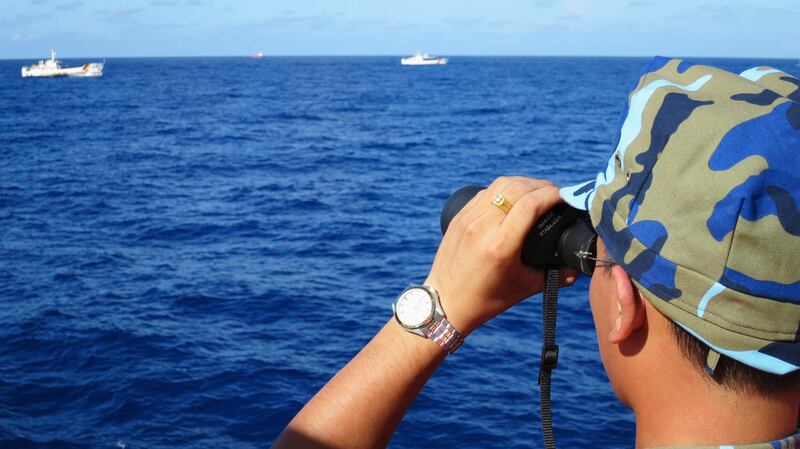Indonesia has invited officials in charge of maritime security from five other countries in the Association of Southeast Asian Nations (ASEAN) to meet early next year to discuss how to respond to China’s assertiveness in the South China Sea.
Head of the Maritime Security Agency (Bakamla), Vice Adm. Aan Kurnia, was quoted in the Indonesian media as telling reporters that he’d invited his counterparts from Brunei, Malaysia, the Philippines, Singapore and Vietnam to a meeting in February 2022 to “share experiences and foster brotherhood” among the countries facing similar challenges posed by China.
Maritime agencies from the six countries took part in an ASEAN Coast Guard Forum last October, signalling willingness to cooperate.
The Jakarta Post quoted Aan as saying that it is important “to present a coordinated approach” in matters related to the South China Sea, and “how to respond in the field when we face the same ‘disturbance’.” The vice admiral did not mention China by name.
The initiative is being praised by some analysts.
“Coast guards in Southeast Asia have a bad history of cooperation - they see each other as their primary challenges, even worse than the navies, which have learned to cooperate amid competition,” said Thomas Daniel, a senior fellow at Malaysia’s Institute of Strategic and International Studies (ISIS).
“I think what the Indonesians are proposing is very interesting and bold. At least they are trying something,” Daniel said.
China’s sweeping claims in the South China Sea are disputed by other regional countries and were invalidated by an international tribunal in 2016. However, Beijing continues to harass other countries when they are exploring resources in these waters.
Indonesia is not a claimant in the South China Sea dispute but recently Beijing told Jakarta to stop drilling for oil and gas near the Natuna islands inside Indonesia’s exclusive economic zone (EEZ) as the block lies within the so-called “nine-dash line” that China uses to demarcate its expansive claims.
The Chinese coast guard has also been active across the South China Sea.
A meeting similar to the ASEAN Coast Guard forum would be a “great opportunity for ASEAN coast guards and maritime law enforcement agencies to talk and cooperate with each other,” said Satya Pratama, a senior Indonesian government official and a former Bakamla captain.
“It is also a good idea for Indonesia (through Bakamla) to explain Indonesia’s intention so that others can understand and follow suit,” he said.

Coalition to push South China Sea negotiation?
ASEAN has a checkered history of cooperation on the South China Sea, which has emerged as a source of tension with China. It’s also been a source of division in the 10-nation bloc itself as it has tried to negotiate a Code of Conduct (COC) to regulate maritime activities there, with some nations like incoming ASEAN chair Cambodia reluctant to criticize Beijing.
Philippine Foreign Secretary Teodoro Locsin, Jr. alluded to those difficulties earlier this month when he addressed a meeting between foreign ministers from ASEAN and Group of Seven (G7) developed countries.
He said that as ASEAN countries and China struggle to agree on the South China Sea issues, “recent incidents and the heightened tension … remain a serious concern.”
“These worrying developments underscore the urgency and importance of the Code of Conduct in the South China Sea … But negotiations for the COC, even in our watch, went nowhere,” Locsin said.
Observers say that a united ASEAN approach is difficult as “not every ASEAN member gives the same weight to the South China Sea dispute.”
“China has successfully exploited ASEAN’s decision-making by consensus to ensure that it has greater leverage in statements by ASEAN on the South China Sea, and in the COC negotiation itself,” Daniel from Malaysia’s ISIS said.
“Perhaps it’s time for the most directly involved ASEAN countries - the claimant states - to take the lead and not depend too much on the rest of ASEAN,” Daniel said.
Some suggest that a smaller grouping – a coalition of four or five member states – would be more effective.
Antonio Carpio, a former justice of the Philippine Supreme Court, was quoted by the Philippine Center for Investigative Journalism (PCIJ) as saying that five ASEAN coastal states - the Philippines, Vietnam, Malaysia and Brunei, plus Indonesia - should form a coalition "to oppose China's hegemony and bullying."
But Daniel warned that “getting the four claimant states together is going to be very difficult.”
“There is a longstanding trust issue between them, as well as fear of retaliation by China,” he said.
The Vietnam Coast Guard and the Indonesian Maritime Security Agency on Tuesday signed a memorandum of understanding on cooperation in strengthening maritime security and safety between the two forces. But overlapping maritime claims have been an irritant in Vietnam–Indonesia bilateral relations for decades.
The two countries frequently clash over the issue of illegal, unreported and unregulated fishing. In 2019, for example, Indonesia seized and destroyed 38 Vietnamese vessels for illegal fishing.
A similar situation is observed between Vietnam and the Philippines, as well as between Indonesia and Malaysia, analysts say.
